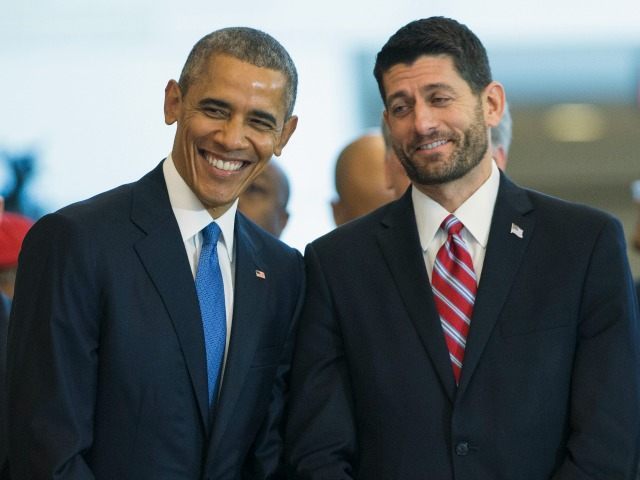On Friday, Treasury Secretary Jack Lew sent a letter to House Speaker Paul Ryan, pressing for congressional action to assist financially-troubled Puerto Rico.
Congress must act by March to give Puerto Rico special bankruptcy protections to allow the territory to restructure its massive debt, Lew claimed.
Breitbart News has obtained a copy of Friday’s letter. It begins:
I appreciate the recent commitment by congressional leadership to produce a responsible solution for Puerto Rico. In order to assist the 3.5 million Americans living in Puerto Rico, Congress must pass legislation for the President to sign into law before the end of March.
As the omnibus spending bill was finalized in December, House Democrat Leader Nancy Pelosi told her colleagues that Speaker Ryan had committed to move legislation to bailout Puerto Rico early in the new year.
Speaker Ryan’s office, however, told Breitbart News that Ryan had only committed to allow legislation on Puerto Rico to be addressed through the normal legislative committee process.
In his letter Friday, however, Lew dismisses the idea that additional committee work is warranted.
Six congressional hearings have been held by five different committees in the past year, with another hearing scheduled for later this month. It is time for Congress to act to provide order to a chaotic and worsening situation.
Lew’s letter is a clear sign that the Obama Administration will soon ratchet-up the pressure on Speaker Ryan and the Republican Congress to act sooner than committee deliberations would allow. With around 3,000 Puerto Ricans leaving the island every week, primarily to electoral vote-rich Florida, the issue is likely to take on more urgency as the Presidential election nears.
One thing all sides can agree on is that Puerto Rico is a fiscal basket-case. The territory owes more than $70 billion, borrowing that was largely used to fuel increased government spending. The island’s debt, in fact, is far higher than its GDP, which stands around $60 billion a year.
Puerto Rico is the third-largest issuer of municipal debt in the United States, even though its population is just over 3 million people. Even as its borrowing has increased, its population has been declining, falling by a massive 10 percent since 2006.
As Lew notes, the territory is already in technical default, delaying many regularly scheduled debt payments. Earlier this month, one major creditor claimed that Puerto Rico had illegally diverted $160 million it was owed in repayments.
One small episode from December typifies the fiscal mismanagement that is plaguing Puerto Rico. At the end of the month, while the island was delaying bond repayments, the island paid out over $120 million in Christmas bonuses to the island’s government workers. These bonuses, apparently, are required by law in the territory. A government that enshrines bonuses into law is a government that is too beholden to public sector employees.
The Puerto Rican government, in fact, is by far the largest employer on the island.
Economically, the island is also a mess. Less than half the adults on the island are employed or looking for work. It has one of the lowest labor-force-participation rates in the Western world. Very high government benefits and a relatively very-high minimum wage have wrecked the labor market on the island. Reforming these would do far more to help the island handle its debt through economic growth than help from Washington.
The government’s bailout plan for Puerto Rico is to allow the territory to access Chapter 9 bankruptcy courts, retroactively, to force a judicial restructuring of its debt. The complication, however, is that the island was specifically barred from resorting to bankruptcy court by Congressional action in the 1980s.
Puerto Rico benefitted enormously from this action, because investors were willing to offer the island better borrowing terms specifically because it couldn’t resort to bankruptcy court. Investors took lower repayments than they otherwise would have, because they were assured the territory couldn’t seek judicial protection from its debt. Changing the rules after the fact would cast a dark cloud on the entire $3 trillion municipal bond market.
Of course, allowing Puerto Rico to enter bankruptcy court would also help the creditors with the deepest pockets, and greatest number of lawyers, recover a larger portion of their investment. Big Wall Street firms, in other words, would probably do well in a Chapter 9 proceeding, while smaller creditor and investors would lose most of their money.
Supporters of allowing Puerto Rico to access bankruptcy court will argue Congressional action isn’t a bailout, because taxpayer funds aren’t directly involved. This is to put such a narrow definition on bailouts as to render the concept useless. Allowing Puerto Rico to change the rules of the game mid-stream, and apply those changes retroactively, creates the same moral hazard that writing a check directly from the U.S. Treasury would entail.
There is a very real cost to taxpayers though, even if it is indirect. By telling the municipal bond market that Congress will act to rescue a borrower who takes out too much debt, the borrowing costs of all municipalities will be a little bit higher.
Nobody really knows what Speaker Ryan told Nancy Pelosi as he was scrambling for votes to pass the omnibus spending bill. She says one thing, his office says another. Lew’s letter indicates the Obama Administration trusts Pelosi’s recollection of the agreement.
The Obama era began with Congressional Republicans agreeing to a bailout of Wall Street. It may well end with a bailout of Puerto Rico.

COMMENTS
Please let us know if you're having issues with commenting.